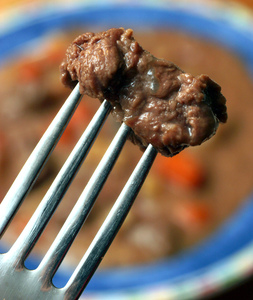Over past weeks, there's been an enormous amount of coverage of the dog-fighting operation sponsored by Atlanta Falcons quarterback Vick, who, along with three other men, has been indicted on federal felony charges.
The details of the charges claim that Vick sponsored illegal dog fighting, gambled on dog fights and permitted acts of cruelty against animals on his property. The talk shows have been filled with talking heads from the "humane community" condemning dog fighting and calling for Vick to be punished. Nike and Reebok have suspended products endorsed by Vick.
Please let me be very clear from the outset: I think that dog fighting is a terrible thing.
But I must say that the Vick case rather dramatically demonstrates what I call our "moral schizophrenia" about animals.
That is, if one thing is clear, it is that we do not think clearly about our moral obligations to animals.
In this country alone, we kill more than 10 billion land animals annually for food. The animals we eat suffer as much as the dogs that are used in dog fighting.
There is no "need" for us to eat meat, dairy or eggs. Indeed, these foods are increasingly linked to various human diseases and animal agriculture is an environmental disaster for the planet. We impose pain, suffering and death on these billions of sentient nonhumans because we enjoy eating their flesh and the products that we make from them.
There is something bizarre about condemning Michael Vick for using dogs in a hideous form of entertainment when 99 percent of us also use animals that are every bit as sentient as dogs in another hideous form of entertainment that is no more justifiable than fighting dogs: eating animals and animal products.
There is something bizarre about Reebok and Nike, which use leather in their shoes, suspending products endorsed by Vick. They're not going to allow a guy who allegedly tortures dogs to endorse products that contain tortured cows.
In one of my books about animal ethics, I introduced a character named Simon the Sadist, who derived pleasure from blowtorching dogs. We would all regard such conduct as monstrous because we all agree that it is wrong to inflict "unnecessary" suffering on animals - and pleasure, amusement and convenience cannot count as satisfying the "necessity" requirement.
But then I asked the further question: How are those of us who eat animal flesh and animal products any different from Simon? He enjoys blowtorching dogs - we enjoy the taste of flesh and animal products. But we and Simon both kill sentient beings (although we may pay others to do the dirty work) because we derive enjoyment from it.
According to reports, authorities removed from Vick's property a "rape stand" used to hold dogs for mating. "Rape racks" are used to hold cows for impregnation. When a dog is involved, we are troubled - when a cow is involved, we ignore it.
Michael Vick may enjoy watching dogs fight. Someone else may find that repulsive but see nothing wrong with eating an animal who has had a life as full of pain and suffering as the lives of the fighting dogs. It's strange that we regard the latter as morally different from, and superior to, the former. How removed from the screaming crowd around the dog pit is the laughing group around the summer steak barbecue?
We are all Simon.
We are all Michael Vick. *
Gary L. Francione is Distinguished Professor of Law and Nicholas deB. Katzenbach Scholar of Law and Philosophy at Rutgers University School of Law-Newark. His latest book on animal ethics, "Animals as Persons," will be published by Columbia University Press this fall.
© 2007 Gary L. Francione






